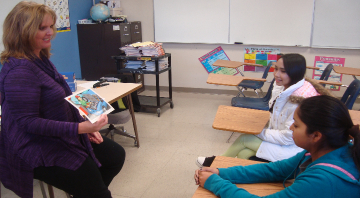AC’s English as a Second Language classes remove barriers to success
 With a student success rate near 90 percent, English as a Second Language (ESL) classes at AC are helping lift English proficiency, particularly among the area’s burgeoning immigrant population, to heightened levels in grammar, composition, reading, speaking and listening.
With a student success rate near 90 percent, English as a Second Language (ESL) classes at AC are helping lift English proficiency, particularly among the area’s burgeoning immigrant population, to heightened levels in grammar, composition, reading, speaking and listening.
“This class works, it helps very much,” Ram said. “I remember class was very quiet the first day. Everyone was afraid they would say something wrong, but in a couple of days everyone had something to say — a lot to say. We made a lot of friends since then.”
“We’re as diverse as we can possibly be, as diverse as America,” said Lisa Goen, an ESL instructor who typically teaches classes containing students from Burma, China, Columbia, El Salvador, Mexico, Saudi Arabia, Thailand, Turkey and more. “You can get a glimpse of the whole world right here in our little classroom at Amarillo College,” she said.
Goen says those who move to the U.S. during childhood, as Ram did, often are compelled to assimilate to English largely on their own. Ram did just that while immersed in public education and ultimately passed the requisite standardized tests to graduate from high school; however, formal ESL instruction is vital for students like Ram who plan to confront the challenges of college-level coursework, Goen said.
AC serves about 300 ESL students each semester in classes limited to 25 students each. Classes are offered mornings or evenings, Monday through Thursday, to a diverse array of students whose primary languages might range from Arabic and Spanish to Turkish and Thai, just to name a few.
“I never blame my students for being self-conscience the first few days of class,” Goen said. “Chances are they don’t know anybody or even speak the same language as anybody in the room. Just imagine what that must be like for anyone.
“But they always come a long way in a short period of time because they have purpose. They are driven to learn the language of their new home, and the vast majority of our students improve their skills enough that they are able to begin academic studies at the College, if that is something they choose to do.”
Thanks to a grant from the Texas Workforce Commission, all four levels of program are offered free of charge.
To qualify for ESL classes at AC, students must demonstrate at least a minimum understanding of the language — some speaking ability and comprehension, and skill enough to write a simple sentence.
“Students must demonstrate at least some aptitude for English because we have to determine whether or not an instructor will be able to communicate with them in a group setting,” Carol Summers, chair of the ESL program, said.
An assessment can take up to five hours over two days, she said. Those applicants who fail to qualify for classes at AC are not cast adrift; they are referred to the Amarillo Area Adult Literacy Council, which has programs designed specifically to meet the needs of beginning English learners. Many utilize AAALC resources and subsequently return to qualify for AC classes, Summers said.
For those who do qualify to enter AC’s academic-based program, new classes begin every eight weeks during the traditional fall and spring semesters. The next opportunity for registration will be March 7 & 8 at Russell Hall on AC’s Washington Street Campus. Anyone interested in improving their English skills is invited to apply. Applicants must attend both days of the assessment process, for about two hours the first day and three hours the next. They may choose to attend sessions on those days either at 8 a.m. or 4 p.m.
All students seeking to enroll will be required to present a government-issued photo ID containing their date of birth. The ID can be issued by any government or country.
Matthew Piech recently joined the College administration and serves as ESL program coordinator. He invites anyone to participate in the assessment process or to call him at 806-371-5391 with any questions they may have.
“We strive to offer a supportive and non-threatening environment,” Piech said. “The assessment is only one determining factor in our placement process. The main thing we want to do is make sure no one is placed in a level that is either too hard for them, or too easy.”
Students who successfully complete all four levels of the ESL program receive a certificate of completion that entitles them to pursue additional programs of study at the College.